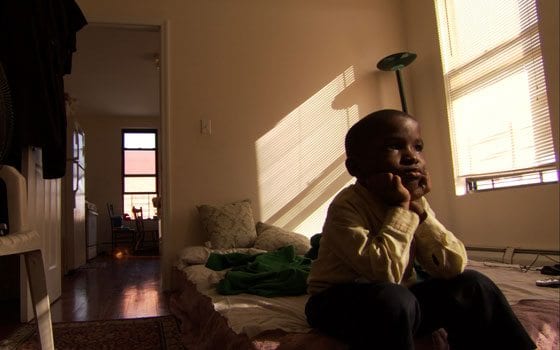



A new film on Harlem Success Academy raises a question – why aren’t there more across the country?
| Parents on both sides of the charter school debate attend a public hearing to expand Harlem Success Academy into a building currently used for a zone school in Harlem. | Eric Sr. watches the list of lottery winners as they are called during the public lottery. He is hopeful that Eric Jr. will win a spot at Harlem Success Academy. | Christian and his father Emil Yoansan nervously wait for Christian’s name to be called. Each child entered into the lottery stood a one in seven chance of winning a spot at the charter school. (Photos courtesy of “The Lottery” film.) |
In white lettering against a black backdrop, “The Lottery,” an official selection of Boston’s Independent Film Festival (IFF Boston), starts with poignant statistics: “The average black or Latino 12th grader reads at the same level as the average white 8th grader.”
Another graphic shows that in 19 of the 23 districted Harlem schools, fewer than 50 percent of the students read at grade level.
Despite the numbers, “The Lottery” film director Madeleine Sackler didn’t have the usual take.
“Most Americans,” Sackler said, “believe that the academic achievement gap is the result of a lack of interest in education or a lack of family structure in low-income communities.”
But what she discovered was completely different. It started two years ago when she happened to watch a local news story on the lottery system for admission to the Harlem Success Academy.
“I saw thousands of parents who wanted a better education for their children,” Sackler said. “After one woman told me that the achievement gap doesn’t matter because ‘we will always need shoe shiners,’ I began work.”
“The Lottery” centers around four kindergarten-aged charter school hopefuls: Ameenah, Christian, Eric Jr., and Greg Jr., as they vie for chance-placement at Harlem Success Academy.
Determined to tell their story, Sackler recruited these families at Harlem Success Academy information sessions and followed them for three months.
The four families were among 3,000 in attendance at the 2009 public lottery to fill 475 seats.
Each family has unique circumstances: Ameenah and her mom, who is deaf, receive public assistance; Christian and his father are separated from his mother and brother due to an immigration issue; Greg Jr. and his mom live apart from his father who is serving a 25-to-life prison sentence; Eric Jr. lives with both parents — his father is a union bus driver, and his mother is working toward her teaching credential.
Though they represent a wide-range of family experiences, each parent shares the goal of providing their children with direction and opportunity to attend college.
The documentary made its Bay State premiere in Somerville during IFF Boston last month. The film traces the paths from the children’s homes to the coveted classrooms of Harlem Success Academy.
Students sit on colorful carpets and are educated with new technologies, hands-on activities and traditional teaching methods. Class projects and artwork adorn the walls and are collaged with symbols of achievement: pictures of caps and gowns intermixed with names of colleges and universities.
The children are engaged and eager to correct their teacher when she misspeaks. Proclaiming that they are correct, she rewards the class a star and tells them, “Kiss your brains.”
In unison, the children lay a kiss on their hand and smack it to their foreheads.
In contrast, images of traditional public schools reveal broken windows and deteriorating brick and concrete school-yards. Defending the present public schools in New York is a difficult task and the silence of the powerful New York City teacher’s union throughout the film is palpable.
“We actually would have loved to have more access,” said Blake Ashmond Kippervisor, the film producer. “And we tried, we talked to a bunch of teachers personally … and they were willing to be interviewed but they couldn’t get permission to do it. It’s a shame. We wanted to show as much as the other side as possible.”
Charter schools have sparked often visceral debate in some communities in part because they use public funding — and thus drain from traditional schools — and employ experiential teaching practices, a departure from traditional methods.
They tend to have smaller class-sizes — giving them an exclusive reputation — and operate outside of unions.
The Success Charter Network, the non-profit organization highlighted in “The Lottery,” averages larger class sizes than most public schools with 27 students per kindergarten class — yet operates a fiscal budget equal to that of the districted public schools.
“Per pupil,” said Kippervisor, “they receive seventy-five cents on the dollar compared to the traditional zone schools. So they have to go out and raise the rest … They try to raise only the same amount because they want an apples-to-apples comparison. It’s important to them to show that they can do a better job with the same amount of fundraising.”
They also boast a 100 percent passage-rate on all compulsory exams.
Many families mention that they applied for more than one charter lottery to increase their chances. At Harlem Success Academy, only one in seven will win admission.
“Any child can learn at the highest imaginable levels,” Newark Mayor Corey Booker says in the film. “We see kids coming from the most challenging of circumstances that are fortunate enough to get into a good school … and just excel. And so there really can’t be any more excuses, so the question is: Why don’t we have more of them?”
On June 8 the creators of “The Lottery” will host an Education Day screening on 100 screens nation-wide. For information on this event, visit http://www.thelotteryfilm.com.






